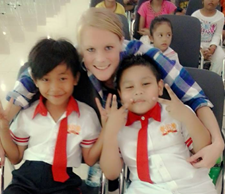
When asked about the reasons for choosing their course, most modern language students would mention the opportunity to spend a year outside the cold and dreary UK. After a few minutes of hearing how lucky they are to have the chance to spend 6 months in sunny Barcelona or chic Paris (insert regional stereotypes here) the modern languages student will inevitably be asked the dreaded question: ‘So, what are you planning to do in your time abroad?’ Panic!
As much as the average linguist romanticises and boasts about their year abroad, many of us do not have any concrete plans for our time abroad until about a third of the way through second-year. By that point we are only a few weeks away from filling in forms whereby we commit ourselves to work or study in Europe or further afield. Compulsory attendance at the Year Abroad Meeting in mid-June is not (just) to stop us enjoying our summer (or rather the UK’s woeful attempt at summer); the main reason for it is to get us thinking about what we want to do on our year abroad.
Where to go – Financial implications
The first important step is to decide where you want to live. If you choose to work in Europe, either through a British Council Teaching Assistantship or an individually sourced placement; or to study at a partner institution in Europe, you will be eligible for an Erasmus grant and will receive a fee waiver.
For those venturing outside Europe or to a non-partner institution within Europe, you will not receive any of these benefits. Whilst partial funding may still be available, for example through the Abbey-Santander Scholarship for Latin America, this reduced financial support is an important factor to consider when making your decision. The year abroad is an invaluable experience and, for many, one that will not be repeated. However, it will not be your only chance to go abroad.
Some places are far more expensive to live in than others, so you need to decide if you are willing to take on this financial burden. As much as you might want to spend the year in Paris or Rio, this might not be the most financially suitable option at this time. Yes, you have your normal student finance entitlements, but not everyone is willing to take out a loan for a fourth year. Furthermore, depending on where and how you choose to spend your year, you could end up with a decent amount of savings by the time you return for your final year.
What to do – Study or work?
The next important decision to make is whether you want to work or study. I cannot stress enough how vital this decision is in determining how your year plays out.
The main advantages of studying are the support you get from the host institution in settling in and finding accommodation etc., the opportunity to live and study with other young people, and the fact that the exams you take (normally) don’t count towards your degree. When choosing where to study, you should bear in mind the differences in the higher education system as the levels of support provided to students can vary. Similarly, course choice is important. You should choose a course that interests you, but you should also think of which course would be most beneficial to your language learning. Depending on your learning style, you might benefit more from smaller class sizes (more interaction with other students) or classes which require regular essays or written work submission. On the other hand, being a student often requires more effort on your part to fully immerse yourself in the culture of your destination as it is easy to fall into the trap of just socialising with other Anglophones or non-native speakers.
This leads me to the main advantage of working. You will most likely spend 6 hours a day, 5 days a week, working and speaking in Russian, Portuguese, Italian etc. This is the best way to ensure that your language skills improve, which is, after all, the main purpose of the year abroad. At the same time, working abroad requires a lot of independent research and you are solely responsible for finding and securing your placements. If you are able to do this successfully, this evidence of maturity and self-sufficiency is very attractive for future employers.
Don’t panic!
Whilst making these decisions might seem a daunting task, they have to be made, so try to keep a cool head when doing so. Think ahead. Talk to careers advisers, personal tutors and students who have already been on their year abroad. The better prepared you are, the more you will get out of this fantastic year which, for many of you, will be the best year of your life.
Rosemary Amadi, BA French & Portuguese
Image: © Tim Riley 2014



 many students asking about teaching English abroad.
many students asking about teaching English abroad. 

 rching Spanish job sites and lists of placements previous students had been on. Don
rching Spanish job sites and lists of placements previous students had been on. Don

